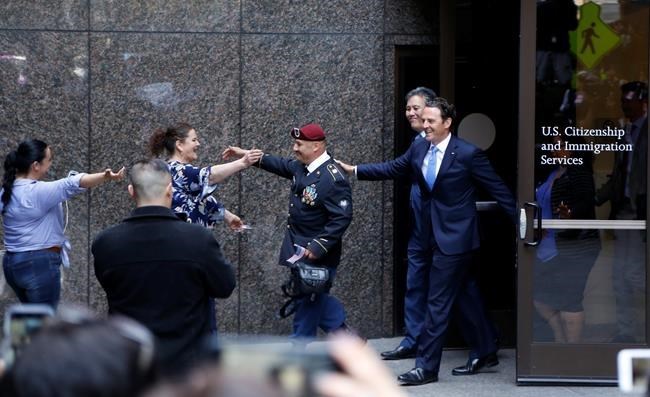
Hector Barajas with Nathan Fletcher walk out of the United States Citizenship and Immigration Services office in downtown San Diego, Friday, April 13, 2018. Hector is greeted by his family. (Alejandro Tamayo /The San Diego Union-Tribune via AP)
Republished April 13, 2018 - 7:30 PM
Original Publication Date April 13, 2018 - 3:21 PM
SAN DIEGO - A decorated former U.S. Army paratrooper whose work on behalf of deported veterans drew widespread attention to his cause became a U.S. citizen Friday, giving immigration advocates a rare reason to celebrate.
Hector Barajas, who was deported to Mexico in 2010, beamed after taking his citizenship oath in a small, private ceremony at a government office in San Diego in full military uniform.
"I get to live the American Dream for a second time," he said, holding a small American flag in his hand at a jubilant news conference.
Barajas founded the Deported Veterans Support Home in the Mexican border city of Tijuana, providing shelter and other services. Extensive media coverage, support from members of Congress and the American Civil Liberties Union's involvement raised his profile.
Barajas got his break last year when California Gov. Jerry Brown pardoned a 2002 conviction for shooting at an occupied vehicle. Brown cited Barajas' military service and advocacy work.
U.S. Citizenship and Immigration Services told him in March that he was granted citizenship.
Hours before Barajas took his oath President Donald Trump tweeted about plans for a border wall with Mexico and a crackdown on so-called sanctuary cities. A surge of deportation arrests and sweeping policy changes have stung advocates of more open immigration policies.
Nathan Fletcher, a Marine combat veteran and chairman of the advocacy group Honourably Discharged, Dishonorably Discarded, said Trump's tweet started the day with "division and conflict and tearing families apart" and ended with Barajas taking his oath.
"It's a tremendous contrast of what can happen and what should happen and it shows that injustice can be overcome," Fletcher said alongside Barajas.
Barajas came to the United States from Mexico when he was 7 years old and obtained a green card through family ties. After graduating from high school, he served in the U.S. Army from 1995 to 2001, when he was honourably discharged, according to his federal lawsuit filed in December seeking citizenship.
He was a member of the 82nd Airborne Division and received several military accolades.
After serving prison time for his felony conviction, he was deported in 2004 to Mexico, lacking fluency in Spanish and struggling to find work, according to the lawsuit. He returned to the United States and was deported again in 2010 after police stopped him for a traffic infraction.
Green card holders who serve honourably in the military are eligible for citizenship, if they don't commit crime and meet other requirements. James Erselius, Barajas' attorney, said getting deported for a crime is typically a bar on citizenship.
Barajas, who served two years in prison, said he regretted his actions but that he "was no less of an American because of the mistakes that I've made." He said he planned to stay at the Tijuana shelter for a year before returning to the Los Angeles to find a job and maybe go to school.
The ACLU said Barajas is the second deported veteran pardoned by Brown to be allowed to return to the United States. It estimates there are hundreds, perhaps thousands, of other veterans who were deported from the U.S.
Marine veteran Marco Chavez was pardoned by Brown for cruelty to animals and allowed to return to the U.S. from Mexico in December.
News from © The Associated Press, 2018